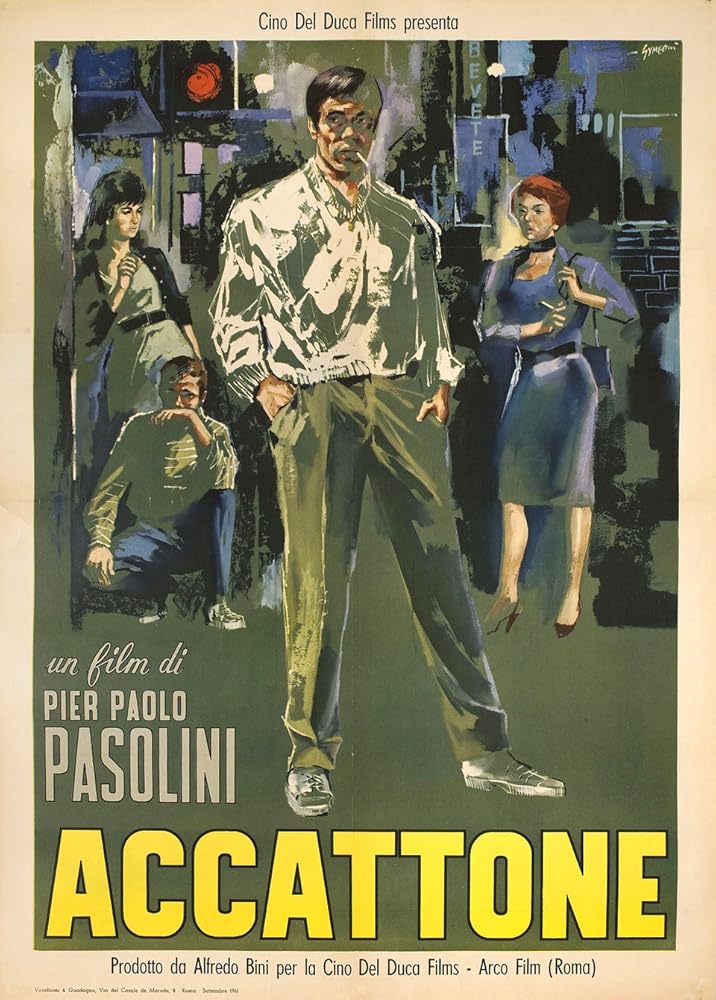
ACCATTONE
(director/writer: Pier Paolo Pasolini; screenwriter: Sergio Citti/based on the novel A Violent Life by Pier Paolo Pasolini; cinematographer: Tonino Delli Colli; editor: Nino Baragli; cast: Franco Citti (Vittorio “Accattone” Cataldi), Silvana Corsini (Maddalena), Franca Pasut (Stella), Piero Morgia (Pio), Paolo Guidi (Ascenza), Adele Cambria, (Nannina), Adriana Asti (Amore), Luciano Conti (Il Moicano), Giovanni Orgitano (Scucchia), Umberto Bevilacqua (Salvatore), Mario Cipriani (Balilla); Runtime: 116; MPAA Rating: NR; producer: Alfredo Bini; Water Bearer Films; 1961-Italy-in Italian with English subtitles)
“A brutally lyrical and unsentimental urban drama grounded in realism.”
Reviewed by Dennis Schwartz
The first feature film of the openly gay, Marxist, poet, journalist and writer Pier Paolo Pasolini (“Salo”/”The Decameron”/ “Teorema”) is a brutally lyrical and unsentimental urban drama grounded in realism that covers the seamy side of life in the Rome slums, a milieu the filmmaker was familiar with from first-hand experience. It’s based on Pasolini’s 1959 novel A Violent Life. A Bach score in the background effectively provides a counterpoint to the mean streets.
Franco Citti’s Accattone is the low-level pimp living in the outskirts of a Rome slum, who goes to pieces when his girlfriend prostitute Maddalena (Silvana Corsini) is sent to prison and he can’t support himself without her; his concern is more of self-pity than for her welfare. Hanging out in the streets with his idler and pimp friends, he agonizes within while on the outside is horsing around with the boys, laughing at bad jokes, making ludicrous bets about performing unusual feats and, in the end, laughing at his own predicament of being trapped in the slums and unable to escape while alive.
It’s a heavy dose of neo-realism infused with ‘new wave’ filmmaking techniques and experimental camera shots; it’s a most hopeless and bleak portrait of turpitude among the young downtrodden men, the pimps, prostitutes and ordinary laborer workers. Even when the self-destructive Accattone falls in love with the virtuous Stella (Franca Pasut), a plausible savior, he fails to turn her into a prostitute and a source of income. In desperation, he tries to get an entry level job at the most meager wages, but he can’t for one reason or another. This leaves Accattone resorting to being a thief and pursued by the police, with tragic results.
Pasolini’s look at poverty is heartfelt, but only skims the surface on the most cursory level. The film’s raw power is in how authentic the cast of mostly non-professionals carry on in their portrait of everyday street life and in how it’s hammered home that they are not all bad but their aimless existence of being ‘rebels without a cause’ keeps them from finding a way out of their perceived imprisonment. One layabout character says: “The world belongs to those with teeth.”
REVIEWED ON 7/31/2007 GRADE: B https://dennisschwartzreviews.com/